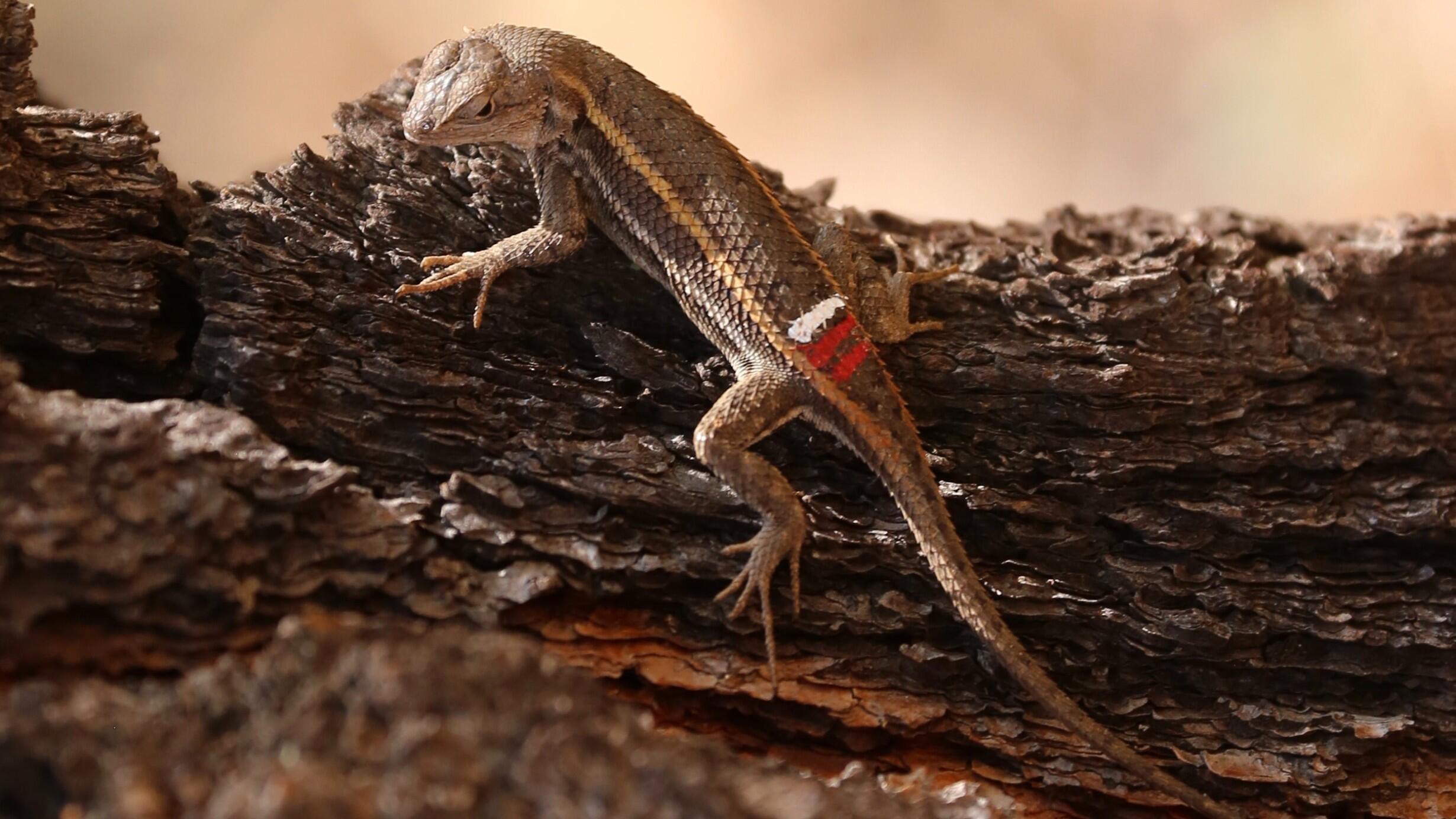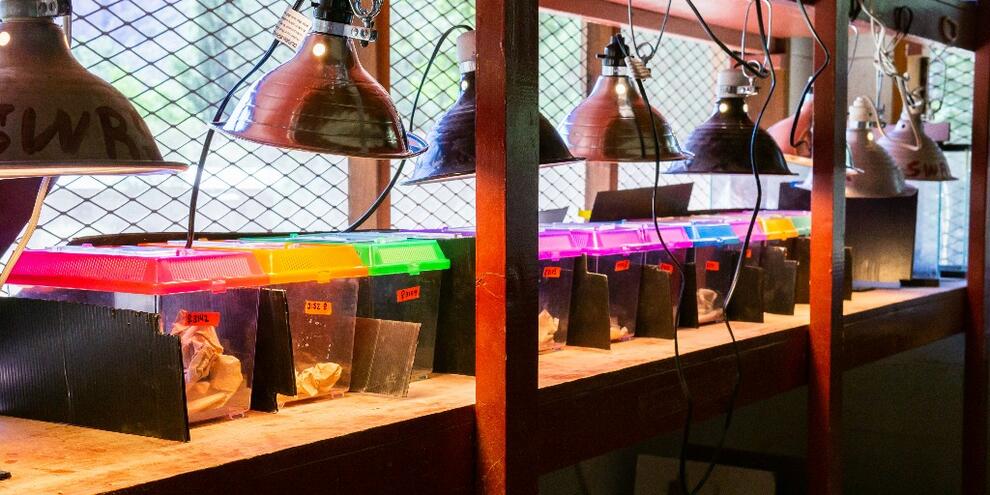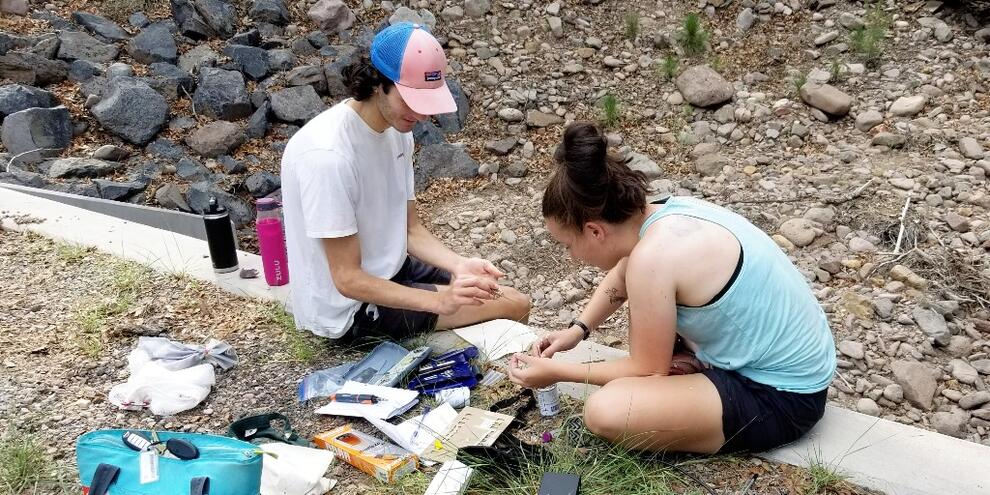Researchers
 Sceloporus virgatus - Striped Plateau Lizard
Sceloporus virgatus - Striped Plateau Lizard© Courtesy of Elizabeth George
Fields of interest include entomology, herpetology, ornithology, mammalogy, botany, geology, arachnology, animal behavior, population genetics, microbial interactions, and physiological ecology.
Numerous long-term studies are in progress, including: communal breeding in Mexican jays, evolution of unisexual parthenogenetic lizards, spadefoot toad reproduction, hummingbird physiology, horned lizard ecology and behavior, sexual selection and behavior in striped plateau lizards, and the evolution of social behaviors in ants.
Are you a scientist interested in conducting research at SWRS? To apply:
- Contact Geoff Bender to discuss your application and reserve lodging.
- Obtain all necessary permits before you arrive. Unsure of which permits you need? Download our handy permit flow chart!
- Submit a completed live vertebrate affidavit if working with vertebrates.
Plan ahead! Reservations for summer housing fill up fast.

 Images Courtesy of A. Ebersole and S. Weiss
Images Courtesy of A. Ebersole and S. Weiss
Laboratories and Animal Holding facilities: SWRS has laboratories where scientists may set up bench-space to conduct their work. Outdoor animal behavior enclosures are available, such as the Animal Behavior Observatory (ABO) and lizard pens. We also offer indoor animal holding facilities such as the Live Animal Holding Facility (LAHF), which contains four climate-controlled rooms and 2 screened-in, natural light/temperature porches on either end. The station property (approximately 100 acres of riparian and Madrean pine-oak forest) is available for field research.
Specialized technical equipment is available for researchers including a chemical ventilation hood, reverse osmosis water, ice machine, environmental chambers, dissecting microscopes, refrigerators, a phase contrast microscope, -80 freezer, centrifuge, pipettors, balances, drying ovens, flags, aquariums, and heat lamps. Microscopes may be limited in number when needed by large taxonomy courses. Please contact us with any questions about equipment, and to reserve items you need in advance.
Storage and Chemicals: We rent storage lockers for researchers who want to keep equipment on site for future visits. Scientific supply companies may be unwilling to ship materials like ethanol to the station, so we recommend that researchers plan for their supplies early and bring all of their required chemicals with them. Please note that we have no means of chemical disposal here, and researchers must take all chemical wastes away at the end of their visit!
Library and Collections: We have a small, specialized library on site with publications relating to all the major groups studied here. We also house several scientific collections with regionally synoptic collections of birds, mammals, reptiles, insects, and spiders, as well as an extensive herbarium.
Internet: The Conference/Social Room, Education Building, and laboratories are wired for internet. We also have a computer in the dining hall porch you may use. Wireless is available in most open areas around the Station such as the porches outside the rooms, the reservoir, and at most picnic tables scattered around the Station. We do not guarantee the wireless connection will be available at all times. Heavy rains and other adverse conditions can sometimes interfere with wireless capabilities. You are welcome to bring a laptop and use wireless when it is available (about 90% of the time) in the areas mentioned above.
Availablitity: These facilities are available to scientists staying here. Non-registered scientists may access the library/collections area, however they must sign in at the office prior to doing so.
The Southwestern Research Station is operated by the American Museum of Natural History, a nonprofit research and educational institution. All income from fees is used to help defray the operating costs of SWRS. Use of the scientific facilities and equipment is included in the researcher fees. We offer reduced rate accommodations for researchers and for students, and will provide a quote for your visit when you contact us to make your reservation.
To qualify for researcher rates, you must have a research application and proposal on file. To qualify for student rates you must be in a degree seeking program and have a research proposal on file.
The Southwestern Research Station Graduate Research Award was endowed by an anonymous donor to support field research by graduate students at the American Museum of Natural History’s Southwestern Research Station in Portal, Arizona. The purpose of this competitive award is to make extensive station-based fieldwork possible for graduate students (PhD or Masters), recognizing that such fieldwork provides a uniquely immersive opportunity to explore their study system and develop a sense of place.
The recipient receives an award of up to US $5000 to be applied towards covering station fees, research equipment and supplies, and travel expenses. Supported fieldwork must be in the Chiricahuas or neighboring areas. Regional projects including those with components at neighboring field stations within Arizona will be considered, but supported research must be based in part at SWRS. Graduate students in any stage of their thesis work are eligible, as long as they have not yet completed their data collection. Previous award recipients may reapply. A call for proposals is issued each year in early spring.
Graduate students should also consider applying to the American Museum of Natural History’s Theodore Roosevelt Memorial Grant or Frank M. Chapman Grant (for ornithological work).
Graduate students who do not receive an award in a given year may request the station for reduced rates (up to a 50% reduction in room and board) from our Student Support Fund. To qualify, students should submit attach their un-funded application(s) to the SWRS Field Research, Roosevelt, or Chapman Award and a request for reduced fees to their researcher application.